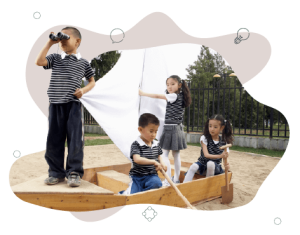25 Challenges for assessing learning in a play-based approach
Assessing learning in a play-based approach is not without challenges. Related research points to the challenges of classroom management and planning, implementing assessment techniques that don’t interrupt the learning, and play being seen as a legitimate way through which to assess learning (Nolan & Paatsch, 2018.)

Case study – voices from the field
In the ‘Differentiated/Play-based inquiry learning in the early years of schooling’ project discussed earlier, the teachers who are assessing learning in a play-based approach in their primary school classrooms held concerns relating to classroom management and planning which act as barriers to their ability to assess learning through play. One teacher explained the situation:
“The main challenge I would find assessing play, is managing the whole class and behaviour while the play is occurring. This would take a lot of practice to have the whole class either engaged in learning and having a small group only in a ‘play’ setting. Or being able to manage the whole grade engaged in play. In reality things don’t always go as you plan.”
When teachers step back and observe student play, or enter the play as a player, a deeper insight into the student as a learner is possible. This challenges teachers to think differently about their role as it moves away from a common assessment practice of taking students aside to assess them individually on set tasks.
Read, look, or listen
What does the research say?
A study by Nolan and Paatsch (2018) found that the teachers in their study appeared to view the learning that occurred in play as separate from the learning that occurred in other planned curriculum activities. This misses the opportunities that play affords to assess a student’s skills and knowledge across curricula areas.
One teacher noted their challenge “I believed that I had to pull students away from what they were ‘playing’ with to ‘play’ with a numeracy activity. I didn’t make the connection that building blocks could not only be a great focus for identifying colour, or number of blocks but also the communication as to how they made their creation.” This teacher’s reflection demonstrates how teachers who are alert to leaning outcomes across the curriculum can assess many aspects of student’s learning through student’s play.
Interrupting student’s play to assess their learning is something that teachers are often concerned about. This is where taking observations while the students are playing and then talking with them after the session about what they did during the play and what they learnt is less intrusive. This means finding time within a very busy school day for play to develop without interruptions and then scheduling time to reflect on the learning. The following questions (used in the DET case study shared throughout this text) could be useful for you, the teacher, as you support children to reflect on their own learning. Children benefit from teachers who encourage them to think about their learning as they play.
The key questions you coud use include:
- What are you learning?
- Why are you learning this?
- How are you learning this?
- How will you know when you have learned it?

Engage and extend
Watch the video (1:57) below from the DET case study. Marie, an experienced Foundation teacher, expresses her initial hesitancy when a play-based learning approach was to be implemented at the school where she taught. Marie reflects on concerns that relate to assessment and what she found in practice. Note how Marie now views the assessment she is able to carry out during the student’s play as “authentic”. What were the examples and reasons she shared to support this reading?

